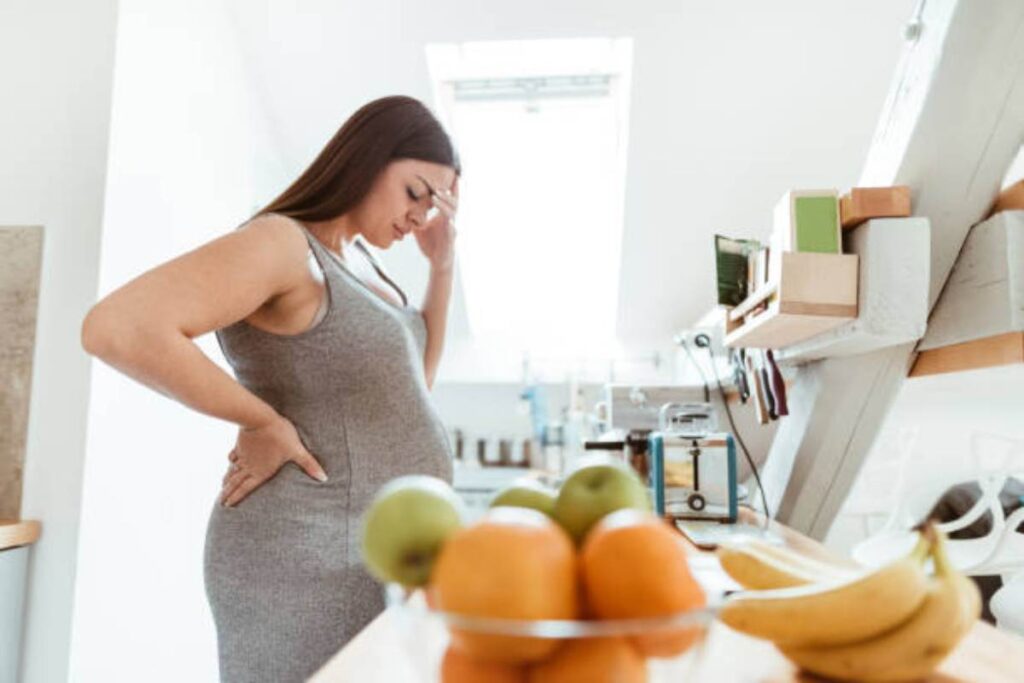Eating healthy and balanced food during pregnancy is vital for the expectant mother’s and her baby’s well-being. This is because everything a woman consumes during pregnancy is the primary source of nutrition for the baby. An expectant mother’s diet should include a variety of healthy nourishments such as fruits, vegetables, and proteins to give the baby the nutrients needed for growth and development. When it comes to eating well during pregnancy, choosing the foods best for you and your baby’s health can be challenging.
Want to know what to eat during pregnancy? Below is a list of pregnancy foods that contain all the nutrients needed for the proper growth of your baby.
Indian Diet Chart And Meal Plan For Pregnancy
|
Week Days |
Pre-Breakfast Snack |
Morning Breakfast |
Mid-Morning Snack |
Lunch |
Evening Snack |
Dinner |
|
Day 1 |
8-12 pieces of dry fruits, including cashew nuts, almonds, and raisins. | Moong dal-3 tbsp + mint/choconut chutney-2 tsp | Blueberry shake (1 cup) | 1.5 cup Mutton biryani + Cucumber onion Raita (½ cup) | Sweet potato salad (cooked with 200 gms of sweet potato, 1 pinch of chat masala, and 1 tsp lemon juice) + light tea (1 cup) | Wheat dosa 3 + ½ cup bitter gourd sabji |
|
Day 2 |
Homemade fruit juice with strawberries, pomegranate, guava, or oranges (1 glass) | Wheat dosa-4 + Tomato sabji (½ cup) | Vegetable soup made with broccoli and garlic (1 bowl) | 1.5 cup rice + 1 piece of chicken + 1 cup broccoli sabji | Mixed fruit salad made of mangoes, bananas, and berries of your choice (1 medium-sized plate) | Moong dal-3 tbsp + mint/choconut chutney-2 tsp |
|
Day 3 |
Banana milkshake (1 glass) | Veggie-rich sevai or upma (1 cup) + 2 medium-sized parathas | Kaddu ka soup or pumpkin soup (1 bowl) | 1.5 cup Mutton biryani + Cucumber onion Raita (½ cup) | 10-14 pieces of dry fruits | Multigrain toast (2 in no) with two sunny-side-up eggs |
|
Day 4 |
Carrot juice (1 glass) | Oatmeal (1 cup) + 2 boiled eggs | Banana milkshake (1 glass) | 1.5 cups of rice, 1 piece of mutton + 1 bowl of daal sauce | Mixed fruit salad made of mangoes, bananas, and berries of your choice (1 medium-sized plate) | Veggie-rich poha (1 cup) + 2 moong dal chillas |
|
Day 5 |
1 plain glass of milk | Veggie-rich poha (1 cup) + 2 moong dal chillas | Tomato Soup (1 bowl) | 1.5 cup chicken biryani + cucumber onion raita (½ cup) | Vegetable salad (1 plate) made with carrots, cucumber, and onions | Multigrain toast (2 in no) with two sunny-side-up eggs |
|
Day 6 |
Banana milkshake (1 glass) | Oatmeal (1 cup) + 2 boiled eggs | Kaddu or pumpkin soup (1 bowl) | 1.5 cups of rice, 1 piece of mutton + 1 bowl of daal sauce | 10-14 pieces of dry fruits, including cashew nuts, almonds, and raisins | Wheat dosa-4 + Tomato sabji (½ cup) |
|
Day 7 |
1 plain glass of milk | Veggie-rich sevai or upma (1 cup) + 2 medium-sized parathas | Peach milkshake (1 glass) | 1.5 cup vegetable khichdi + 1 piece chicken + 1 small bowl of dahi | 1 medium-sized avocado with 1 spoonful of peanut butter | Veggie-rich poha (1 cup) + 2 moong dal chillas |
Foods And Beverages To Eat During Pregnancy
- Dairy: Dairy products are rich in various nutrients, such as calcium and vitamins, that help support the baby’s development.
- Legumes: Legumes are rich in plant-based nutrients that contain protein, fibre, iron, folate, and calcium, which are essential during pregnancy.
- Sweet Potatoes: Sweet potatoes are rich in beta-carotene, a vitamin that is essential for healthy fetal development.
- Salmon: Blush is rich in docosahexaenoic acid (DHA), an omega-3 fatty acid deficient during pregnancy, so supplementation is necessary.
- Eggs: Eggs are an unresolved source of protein. They provide the amino acids your baby needs for development. They also contain over a dozen positive vitamins and raw materials, including choline.
- Broccoli and Leafy Greens: Leafy greens like broccoli remain rich in vitamins A, C, B6, K, folate, and antioxidants. Thus, they ensure good hemoglobin levels, promote bone health, and prevent skin problems. Lean meat and protein: Lean meat is an excellent source of high-quality protein, which is good for your health during pregnancy.
- Berries: Berries contain much water, healthy carbohydrates, vitamin C, and fibre. In addition, they can help increase your nutrient and water intake.
- Whole grains: Whole grains remain rich in minerals and B vitamins essential for fetal development in almost all body parts.
- Avocados: Avocados are rich in many nutrients such as vitamin C, folacin, and magnesium, which are essential for the baby’s development.
- Nuts: Nuts are rich in calcium, potassium, and zinc. Due to their high fibre content, they help prevent constipation during pregnancy.
- Fish oil: Fish fat is rich in omega-3 fatty acids, the healthiest fats. They reduce the risk of premature birth.
- Water: During pregnancy, you should drink at least 8-11 glasses of water a day. This helps with digestion and keeps the protective fluid called amniotic fluid around the fetus.
Food And Beverages To Avoid During Pregnancy
- Fish with High Mercury Content: Eating fish with high mercury content causes mercury to build up in your blood over time. Excess mercury in your blood can harm your baby’s developing nervous system and head.
- Undercooked or Raw Fish: Rare fish is more likely to contain parasites, bacteria, or germs than fully cooked fish. It is not recommended to expose your baby to these!
- Undercooked, Raw, and Processed Meats: Processed meats may contain Listeria origins, which can cause food poisoning and vomiting in pregnant women. Raw or undercooked meats may also contain germs, including bacteria that can cause disease.
- Raw Eggs: Raw eggs should be avoided throughout pregnancy. For example, they may contain disease-causing Salmonella bacteria, which can cause food poisoning, sickness, and diarrhea.
- Organ meats: Organ meats contain vitamin A, which, in excess, can cause congenital disabilities in babies and even miscarriages, especially in the first trimester of pregnancy.
- Caffeine: Caffeine remains a stimulant that can raise your heart rate and blood pressure, which is bad for you during pregnancy. Caffeine can also cross the placenta, the barrier between you and your baby.
- Raw sprouts: Raw sprouts thrive in warm, moist conditions, which are ideal for the growth of bacteria (like Salmonella and E. coli). So, eating raw sprouts can make you sick.
- Unwashed foods: Eating unwashed or contaminated food during pregnancy can expose you to the dangerous parasite Toxoplasma gondii, common in rare meat and unwashed vegetables.
- Unpasteurized milk, cheese and fruit juices: Raw unpasteurized milk may contain microorganisms such as E. coli, Listeria and Campylobacter jejuni, which can cause foodborne illness. Alcohol: Drinking alcohol during the first trimester of pregnancy may cause structural defects in the baby; i.e., the baby may have abnormal facial features.
- Processed junk food: Eating processed junk food during pregnancy may increase the amount of acrylamide, a toxic substance in the mother’s body, which is harmful to the baby. This Indian pregnancy diet may not be suitable for everyone. We can design a customized diet for food allergies or complications.
Conclusion
Maintaining a healthy, balanced diet through pregnancy is crucial for your growing baby, who must absorb all the nutritious food you eat. You can eat many healthy foods to ensure your baby’s health and safety. Follow the diet chart above and let your gynecologist know your dietary preferences so that they can prescribe additional supplements if needed. Enjoy a healthy and fulfilling pregnancy!
Frequently Asked Questions
1. What should I eat in the first month of pregnancy?
Eating vitamin B6-rich foods like nuts, salmon, and bananas in the first month of pregnancy is good.
2. How many calories do mothers-to-be need in a day?
Expectant women need an extra 300 calories daily so that adequate intake would be between 2,200 and 2,900.
3. What should I eat or drink if I suffer from morning sickness?
Electrolyte drinks, water, and ginger ale can be consumed to help relieve the symptoms of morning sickness.
4. Is rice good for pregnancy?
Rice can be eaten in moderation during pregnancy. Rice contains resistant starch, which promotes the growth of beneficial bacteria in the stomach, ensuring healthy bowel movements.
5. Pardon foods help the baby grow in the womb?
Foods rich in protein, such as eggs, well-cooked seafood, lean meat, and poultry products, help the baby grow in the womb.
6. Which biscuit is good during pregnancy?
You can eat crackers made from whole grains or whole wheat during pregnancy.
7. How can I improve my baby’s brain through pregnancy?
- Eat a healthy and well-balanced diet
- Stay fit and active
- Take your supplements regularly
- Gently massage your tummy for a few minutes every day
- Keep your thyroid levels in check
8. Are seasonal fruits good for pregnancy?
Yes. Pregnancy is a time to enjoy local and seasonal fruits. Berries remain rich in vitamins, minerals, and fibre. They keep your energy levels high and suit a healthy mane and skin during pregnancy.
9. Which vegetables are suitable for pregnancy?
Broccoli, lettuce, spinach, tomatoes, carrots, and bitter gourd are some vegetables that are good for pregnancy.


